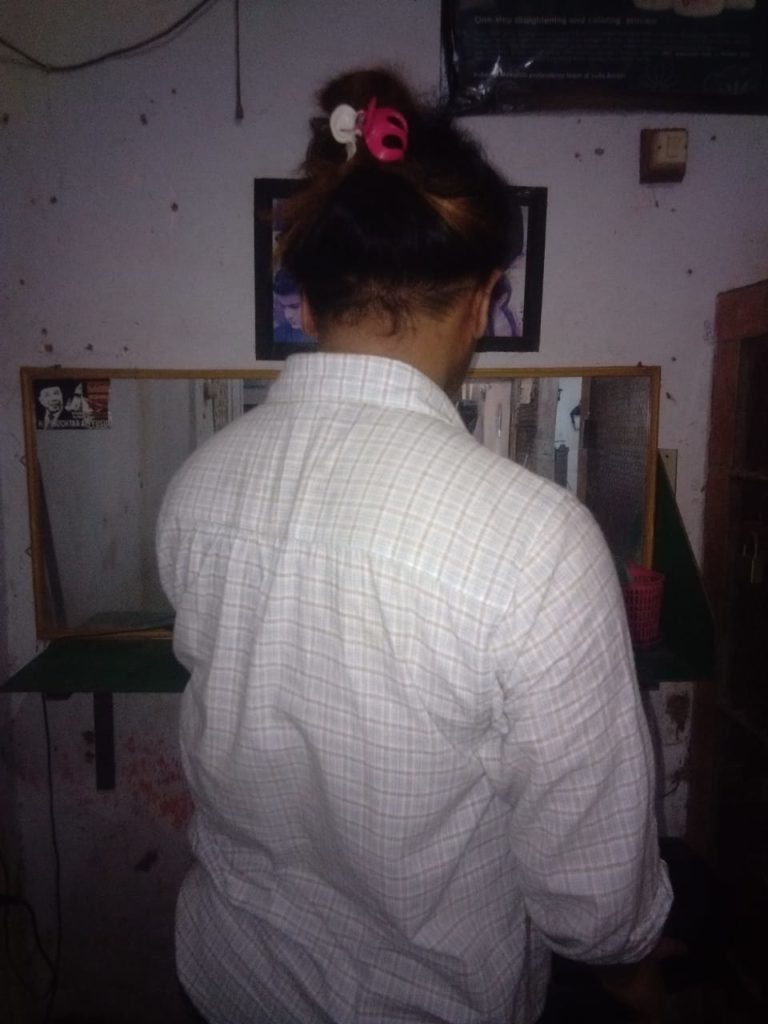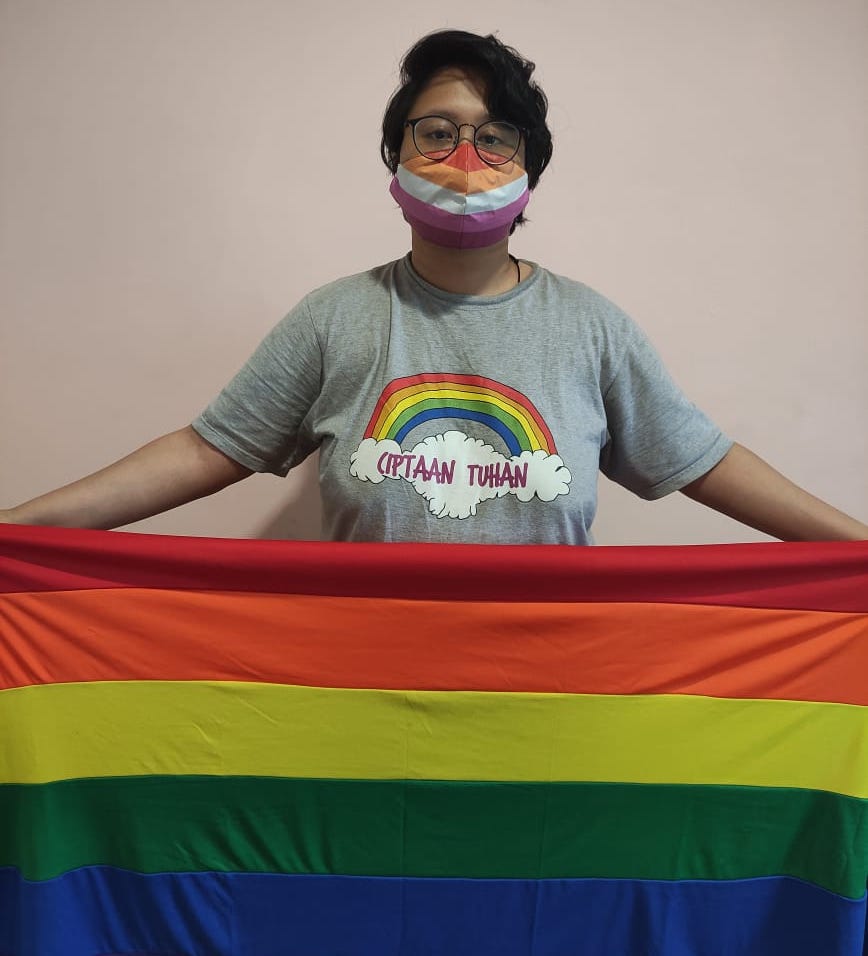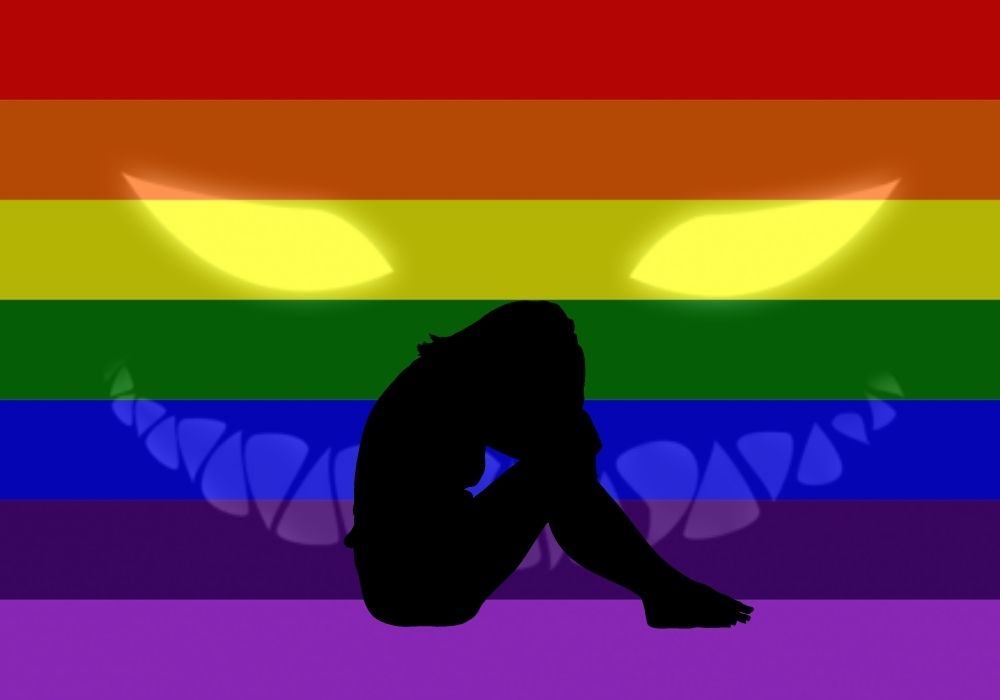Carolyn* can never get out of her head the memory of her parents bringing her to conversion therapy. The transwoman from South Sulawesi was 13 then, and society expected her to identify as male in accordance with her biological sex at birth.
“Deep inside, I kept telling myself that I’m not sick, that I’m okay,” she recalled.
Carolyn experienced ruqyah firsthand, a form of conversion therapy imbued with Islamic exorcism that is common among Muslim communities in Indonesia. Carolyn’s parents explained away her feminine expression as the work of a malevolent female demon.
At the time, the teenager did not fully grasp the situation she was in. She agreed to go along with her parents’ wishes due to her deeply embedded fear of sin.
Carolyn was taken before the local cleric, who prayed to expel the female demon in her body. The cleric also asked her parents to leave her with him for a few days so she could undergo several rituals.
“But at that time, I refused. I wanted to go home and didn’t want to be there. I was fine, I cried and said to my mom, ‘Mom, I want to go home, I’m fine,’” she said.
After begging her mother, Carolyn’s mother finally agreed to send her home on one condition: she had to stop expressing feminine traits and stop hanging out with her female friends. Carolyn repressed her feminine expression for several years after that day.
“To be honest, I felt very tortured. I felt very tortured mentally,” Carolyn confessed.

Carolyn said she placed a lot of pressure on herself over the years. She never felt that she was a man. She was always more comfortable expressing herself as a woman. In the final year of high school, Carolyn decided to stop lying to herself and her family. She ran away from home and learned to become a hairdresser at a salon that accepted her gender expression.
In the early days of Carolyn’s emancipation journey, her past and concerns over her identity continued to haunt her. Not a day went by that she didn’t fear persecution, socializing with others, fully expressing herself, all the while saddened by the irreparable burned bridge with her family.
Even now, at the age of 32, Carolyn is still traumatized by her conversion therapy experience. She gets easily triggered by watching religious TV shows or films that feature ruqyah scenes.
But ultimately she believes that she made the right choice, because nothing can take away her freedom to fully express herself as a woman and her achievement of becoming a fully functioning adult in a society that generally does not tolerate her people.
“I also feel comfortable and feel very relieved that in the end, I can accept myself as a transwoman. I feel like I have found myself. This is me, I am a transwoman,” she stresses.
In contrast to Carolyn, Sofia*, a lesbian living in the capital, was encouraged by her family to undergo ruqyah when she was old enough. By that time, she was mature enough to make her own decisions; and so she ran away from them.
“At that time, I was 25 years old and I was studying for my master’s degree. My position was quite privileged, right?” Sofia said.
Living in Jakarta, Sofia was more exposed to open discussions on the issues of gender and sexuality. When her mother asked her to go to therapy, Sofia was already certain about her sexual orientation. Furthermore, she had been involved in the advocacy for gender and sexuality issues.
“So I think there was nothing to lose at that time, and my identity is the core of my life,” she said.

However, Sofia’s refusal for therapy did not sit well with her family. She said they still pressured her “recover” to the point that they used violence against her.
“But I didn’t want to. I insisted because they already know me as a lesbian, so why do I have to back off?” she said.
Sofia believes that her knowledge of diversity in gender expression and sexual orientation was one of the biggest sources of courage that emboldened her to emancipate. If LGBTQ+ people are exposed to the same knowledge, Sofia said, they will be able to accept their identities and acknowledge that they’re not the problem — homophobia and conversion therapy are.
“We must fight together to convince the world that being gay is okay. You need to learn about yourself. You’re not sick. It’s society that’s sick,” she added.
Ika*, a transwoman from North Sumatra, experienced conversion therapy when she was 13, 17, and 18. The methods that she went through were quite diverse, ranging from ruqyah, to burial rituals, admission to Islamic boarding schools, and goat sacrifice.
None of them worked. And she said she had to live with the constant pressure from her parents to get rid of her feminine expression, which, according to them, was also the work of a demon.
“What should be removed from my body? Because according to their assessment, there is an evil spirit who made me like this,” Ika said.
“In my opinion, conversion therapy is bullshit.”
Ika now works for an NGO advocating to end HIV discrimination and stigma suffered by trans communities.
‘Individual will’
Conversion therapy is not a new phenomenon in Indonesia, but the matter was hotly discussed recently when several Indonesian queer activists, including Lini Zurlia and Kai Mata, received targeted ads on social media encouraging them to undergo conversion therapy.
“It feels like I was targeted by a group of people. It made me upset, especially because this is very sensitive regarding LGBTQ+ rights in Indonesia,” Kai Mata said.
“What I think the government should do is to make it illegal. I also think that LGBT people in Indonesia deserve the right to live in this country without fear.”
Attempts to contact the conversion therapy service through the ad failed as of the time of this article’s publication. Another conversion therapy center in Jakarta, which claims to use hypnotherapy as one of its “healing” methods, did not come across like it has a vendetta against LGBTQ+ people despite providing the harmful service.
“When does sexual orientation become a problem? It happens when the values that are taught [by people’s environment and family] are different from their sexual orientation,” therapist Adrianto Darma Setiawan said.
Adrianto claims to have treated around 2,500 patients in the last 12 years. About 20 percent of these patients are (or were, if he succeeded) gay, lesbian, or bisexual. The standard therapy to “heal” sexual orientation consists of about about five to six hypnotherapy sessions lasting around three hours per session.
Adrianto said that some of his patients underwent therapy out of their own accord, but most were there due to encouragement or pressure from relatives. The therapist did not say how many of his patients he managed to convert, but said that “recovery” depends on the will of the individual.
The government’s failure
Imam Nahei, a commissioner at the National Commission on Violence Against Women (Komnas Perempuan), said that LGBTQ + groups in Indonesia still have a long way to receive adequate protections from the government. For as long as homophobia prevails in Indonesia, conversion therapy will remain as one of the most harmful and real threats that haunts people from minority sexual groups in Indonesia.
Nahei said that conversion therapy is an obvious human rights violation, yet the state, which should be responsible for protecting all of the country’s citizens, has not done anything to protect LGBTQ+ people from the practice.
“The state has not done anything because, in Indonesia, this issue is still very controversial as it is associated with dominant religious views,” Nahei said.
There’s little hope for progress in this regard when homosexuality and alternate forms of sexual expression are still seen as a deviation or a disorder by the country’s lawmakers, such as House of Representatives (DPR) Commission VIII Deputy Chairman Marwan Dasopang.
Marwan supports the existence of conversion therapy in Indonesia. Not only that, he wants DPR to eventually pass legislation allowing the state to provide the service to the public. If conversion therapy was normalized, he argued, patients would not experience extreme psychological trauma, such as from being forced to “recover” by their parents.
“It needs to be regulated,” Marwan said, adding that discussion on the regulation of conversion therapy are still in their infancy.
“You don’t need to like LGBT people, but you also don’t need to discriminate against us, especially to the level of torture.”
Indonesian policy makers, and even psychiatrists, have long gone against the scientific fact that homosexuality and other sexual identities are not a disease or disorder. Their stance have emboldened homophobia, which, in turn, has fostered the continued existence of conversion therapy.
Riska Carolina, director of Advocacy and Public Policy from the Support Group and Resource Center on Sexuality Studies at the University of Indonesia (SGRC UI), said among the many forms of conversion therapy in Indonesia, most are performed with ruqyah. Others who aren’t forced to go the conversion therapy route are still made to see shrinks who practice with heavy religious influence, hypnotherapists, or admitted to religious boarding schools.
“[Conversion therapy] is a threat to the LGBTQ+ community. It is persecution to the LGBTQ+ community. It violates their basic human rights. LGBTQ+ people are not a disease,” she stresses.
Riska believes that regulating conversion therapy would violate the minority groups’ rights even more than they have suffered. Even if the therapy is carried out based on patients’ willingness, Riska argued that it still validates the idea that LGBTQ+ people have mental disorders.
“Conversion therapy must be banned. It is more necessary to provide protection, even though I know that protection is still a long way off. So I prefer that, at least, [the government] treats us equally and gives us affirmative action,” she said.
“I’m ashamed to know that Indonesia is very late in terms of acceptance and it’s already 2021. You don’t need to like LGBT people, but you also don’t need to discriminate against us, especially to the level of torture. What you do with conversion therapy is torturous.”
*Carolyn, Sofia, and Ika’s real names have been omitted, at their request, to protect their identity.


